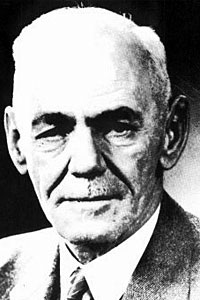Jacob John Siemens, born on the family farm near Altona, Manitoba, devoted most of his adult life to the advancement of farming. After taking over the family farm in 1929, Siemens distinguished himself as a progressive farmer and community leader.
Siemens played a leading role in the organization and development of such organizations as: Rhineland Agricultural Society, Rhineland Consumer’s Co-operative Ltd., Federation of Southern Manitoba Co-operatives; Manitoba Co-op Wholesale Ltd., Manitoba Co-operative Ltd. and the Manitoba Beet Growers Association. In addition he was a director of the Co-operative Union of Canada and an active member of the Manitoba Federation of Agriculture and Co-operation. Recognizing the importance of education in the agricultural community, Siemens organized the Rhineland Agricultural institute. This youth training centre, the first of its kind in rural Manitoba, offered agricultural short courses and home economics courses beginning in 1937. Although the institute discontinued in 1942, Siemens continued to promote the idea of an agricultural and co-operative training centre in the Altona vicinity. Eventually his idea became a reality with the establishment of the Western Co-operative College in Saskatoon, Saskatchewan.
Siemens’ greatest contribution to Manitoba agriculture was the development of the sunflower industry. Due to the critical shortage of vegetable oil during the Second World War and the suitable growing conditions for sunflowers in Manitoba, Siemens marketed the oil extraction plant idea throughout southern Manitoba. Siemens achieved his goal with the organization of Co-op Vegetable Oils Ltd. The building of the oil extraction plant at Altona stimulated the production of special crops in southern Manitoba. Besides sunflowers, rapeseed was introduced during the mid-’50s. Thus a crop diversification program became firmly established in southern Manitoba.
Siemens contributed much to Manitoba agriculture and rural life through his promotion of progressive agriculture, crop diversification, economic co-operation and agricultural education.


